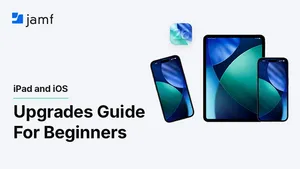What does same-day support really mean and why is it so crucial?
At Jamf, we know how important it is to stay up to date with Apple releases and have done so since 2002. This blog deep dives into the importance of upgrades — and their impact on security and productivity.
With Apple’s next major operating systems expected to be released this autumn, IT and InfoSec teams are getting ready to support their users and ecosystems. When Apple ships new operating systems, Apple management and security vendors must help their customers to upgrade to the newest operating system the moment they are ready, which can happen on the day the newest OS ships.
For Apple management and security vendors, “same-day support” of new Apple operating systems is more than supporting new features; it’s about aligning with the Apple’s direction and vision. From table-stakes security compatibility with new operating systems, to iterative key feature and workflow support, keeping in lockstep with Apple is critical.
Jamf same-day compatibility history with Apple macOS and iOS releases since 2012
It starts with the betas
Apple’s autumn operating system releases provide about three months of beta availability on average — for 2025’s operating systems, Apple released the first betas on June 9. Apple’s spring operating system releases usually provide about seventy-five days of beta availability.
Businesses with Windows and Android environments often do not see a major operating system release every year. The Apple world is different. Every year there is something new for users, IT and InfoSec.
When new operating systems are on the horizon, organizations need their management and security vendors to support the Apple betas so they can adequately test Apple releases prior to their general availability.
By extensively testing the latest Apple betas, IT and InfoSec teams can better identify the impact of new features in order to test and prepare their organization ahead of an upgrade. If vendors don’t support Apple’s betas:
-
Organizations cannot run a complete test in their environment.
-
Devices running a beta could be kicked out of enrollment altogether.
-
Organizations cannot reliably determine compatibility with apps and services.
-
It’s difficult to develop a contingency plan in case critical issues are identified after deployment.
-
You can’t identify issues and allow ample time to mitigate or meet with developers for fix implementation.
-
Admins cannot update or create user workflows that take advantage of the new operating system.
This is unacceptable for the Apple admin community, which is why Jamf has demonstrated a history of commitment to compatibility for Apple’s betas.
Compatibility support is crucial, especially when it comes to security.
For Apple management and security vendors, compatibility for new operating systems the day they are made available to the public is key. When end users unbox a new Apple device or are upgrading existing ones, compatibility support means they can run the latest operating systems the day Apple makes them available. Compatibility also means that IT and InfoSec teams that support end users can be confident critical Apple management, security and identity workflows will remain intact.
It has always been important for management and security vendors to support new features and integrations with key Apple programs like Apple Business Manager and Apple School Manager. But same-day compatibility of the operating system as a whole in the world of security is even more important. If security vulnerabilities exist in an older release, users must be able to move forward to the latest version. And organizations should never be prevented from moving to the latest version of software because their security solution provider wasn’t ready.
Here is why same-day security compatibility is critical in an Apple world:
-
Protection from security vulnerabilities within your environment: An old version of software is less secure software. Therefore, IT admins want to upgrade to the latest operating systems to ensure they don't fall prey to system vulnerabilities. And they must do this while upholding user privacy and keeping users safe and secure. This means ensuring no lapse of protection, from the use of powerful Face ID and Touch ID biometric technology to keeping security rock solid by ensuring that iOS/iPadOS and Apple hardware, like the Secure Enclave, remain unaffected by growing mobile threats.
-
Minimized downtime: When it comes to new operating systems, IT groups must choose the upgrade path best suited for their environment and prepare end users accordingly. Because of Apple’s adherence to security and privacy, their frameworks — what allows users and developers to work with data in secure ways while restricting the methods that could expose them — provide flexibility when upgrading devices, depending on your organization's unique needs. However, if vendors do not provide reliable same-day support, you can’t take advantage of the most efficient upgrade paths available. Or worse, existing workflows break and users experience downtime.
The benefits of keeping up to date
IT teams benefit.
When vendors adopt Apple’s most critical workflows, IT admins have the ability to customize and configure new end-user features based on the unique needs of their environment. A vendor’s ability to accelerate the use of new features also eliminates the headache of running out-of-date operating systems and supporting old application versions.
End users benefit too.
-
Keep end users productive: Apple operating systems often introduce new features that support greater efficiency and productivity for organizations of all kinds. When a vendor doesn’t build upon these features and accelerate their usage, they inhibit users from taking advantage of helpful functionality.
-
Keep end users happy: Apple makes it easy for end users to upgrade within minutes of a new release. The ease of upgrade, combined with compelling new functionality, motivates millions to click update the moment new software goes live. In turn, Apple users expect to be able to successfully update their device(s) the day a new operating system becomes available, similar to how they experience their personal devices at home. By accelerating and supporting new key workflows and features from Apple, you ensure this expectation is met.
-
Encourage users to adopt the newest features and functionalities: When new end-user functionality is added to Apple operating systems, users are eager to use them. Not only does this make end users excited to use the newest functionality that is released, it also helps with productivity.
While compatibility is key to preparing for Apple upgrades, if a vendor doesn’t prioritize adding essential new features to its roadmap, they are not truly supporting the latest Apple technology.
Not all support is created equal
To help you through Apple upgrade support, here are a few things you should confirm about your Apple management or security vendor:
- They offer active beta programs providing you with the ability to test compatibility with Apple’s beta software. At Jamf, we host our beta program on Jamf Nation. (The Jamf Pro 11.20 beta released on August 4th, giving IT teams the ability to test new updates for Apple’s operating systems coming this fall.)
-
They don’t have a reputation of asking customers NOT to upgrade to a new operating system or deploy the latest hardware from Apple. When Apple released macOS Sequoia in 2024, management and security vendors should have enabled customers to upgrade.
-
They have a proven track record of delivering same-day support for previous Apple releases.
-
They provide videos, documentation and digital content to fully demonstrate the management tool’s ability to support new features. Simply seeing a list of new features from Apple doesn’t equate to support.
To learn more about OS upgrades, visit our technical documents >>
The Jamf difference
At Jamf, we are dedicated to helping organizations succeed with Apple. In fact, it’s our mission statement. To achieve our mission, we believe it is critical that we support all of Apple’s releases either on the day they become generally available or before — and we have been doing so since 2002.
Whether it's staying compatible with Apple’s newest operating systems, accelerating the adoption of Apple’s most critical workflows, or extending the power of Apple-specific technology, Jamf is here to help you succeed with Apple.
Rest assured knowing your Apple devices will remain up to date with Jamf.


